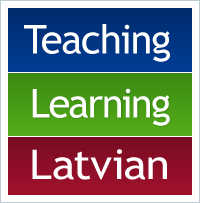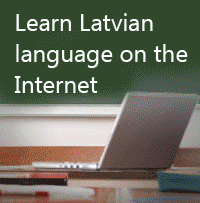Current issues
29.08.2019.
Latvian Language Agency offers a collection of books in a series of creative writing on patriotic themes, books are available for purchase at 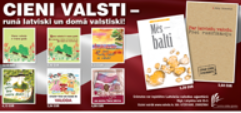 excellent prices.
excellent prices.
The most recent publication is entitled „Mēs – balti” („We the Balts”) – exciting and intriguing information about the origins of the Baltic languages, areas formerly inhabited by he ancient Baltic tribes, their history, interconnectedness of Baltic language, first written sources, research on Baltic languages and study opportunities. (Price 5,39 euro).
„Par latviešu valodu. Pret rusifikāciju. 1944–1989. Dokumenti” – the title translates as „For the Latvian Language. Against Russification. 1944 – 1989. Documents”. This book was tranlated from Russian and edited by J. Riekstiņš. This document collection includes selected documents on language politics in the occupied Latvia from the time period 1944 – 1989. Majority of documents have been published for the very first time.
Excerpts of the best and most beautiful creative writing by Latvian school students, winners of our creative writing competitions, have been collected and published in a series of books, including the following titles so far:
„Mana valoda ir mans gods” (3,13 EUR); this tile has been published in transaltion to French and English language as well under the follwing title: „Mana valoda ir mans gods. My Language: A Matter of Honour for Me. Ma langue est mon honneur” (4,80 EUR); „Iededzies par savu tautu, valsti un valodu!” (4,24 EUR); „Ko, Latvija, Tev varu dot?”(4,13 EUR); „Starp tevi un mani ir valoda” (3,84 EUR); „Latvija, es esmu Tavs bērns” (4,00 EUR).
Books are available for purchase through the Latvian Language Agency: Rīga, Lāčplēša iela 35-5.
For more information please call : +371 67201680 or email at: agentura@valoda.lv
Honour your country – speak Latvian and think from a perspective of the country!
29.07.2019.
Fifty seven teachers from Latvian diaspora schools abroad participated in this year’ s teacher training course in Salacgrīva, Latvia, organized 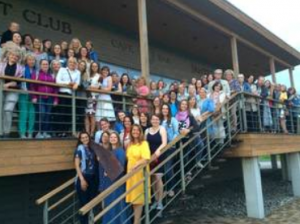 by the Latvian Language Agency.
by the Latvian Language Agency.
The course ran for three days from 10th to 12th July at the recreation complex „Kapteiņu osta”, Latvia. Teachers enjoyed an intensive professional up-training and a cultural programme as well. During the classes teachers, many of whom are not professionally trained in paedagogy, studied te latest on methods for work wit students in informal education setting. Some of the themes presented: „Constructing knowledge: path to knowledge that does not disappear”, „Teaching teenagers: what, how and why we teach?”, „Planning educational processes focussing on attainable goals”, „Masterclass on Public Speach: How to engage pupils and make them listen”, „New study material for diaspora schools”, „ Tools for creating Facebook content”. Teachers were particularly positive about the chance to exchange experiences. Līga Gemute, long time teacher at Latvian diaspora schools in Australia and the U.S.A., author of several study materials, told about her current work on writing a new series of study materials „Adventures” , in cooperation with the Latvian Language Agency. This material will offer a tool for teaching grammar rules in the form of excitings adventures, and will be available to interested teachers already later this autumn. Teachers from Sweden Inese Vallenberga („Radošā rakstīšana diasporas skolās”) and Gunta Neimane („Spēles un uzdevumi latviešu valodas apguvē”) held presentations about their already published teaching and study materials, which are available free of charge at the website: www.maciunmacies.lv . Ilze Stīpniece, teacher from Ireland Latvian school „ Jumitis” hared exciting experiences in managing and carrying out different kind of school related activities.
Evening programme featured a solo performance of Laima Jansone with the „Story of Kokle”, an engaging mystery of sounds with Latvian traditional string instrument „Kokle”. On the second day teachers met two folklore activists Vidvuds and Iveta Medeņi, who really rocked Salacgrīva with their folksongs, dances and traditional games. Teachers gained valuable practice and practical knowledge that can be used in working with their students back at their respective schools. One of the major goals of Latvian diaspora schools is to promote and preserve traditional culture, celebrations and traditions among the Latvian population living abroad. .
For diaspora teachers these summer courses are a celebration of getting together and gaining inspiration and creative impetus for the next academic year. Some of the feed-back responses left after the training: „ Very inspiring and useful content, also I got the feeling that we are not alone,” „The value of networking and finding new contacts during events like this are of incredible value,” „I have gathered so much infrmation, can’t wait to start using it in my work in the little school.”
Teachers from twenty three countries participated in this year’ s summer course for diaspora teachers: Australia, Austria, Belorussia, Belgium, Brasil, Canada, France, Germany, Greece, Georgia, Estonia, Iceland, Ireland, Norway, Poland, Russia, Spain, South Africa, Switzerland, Turkey, the U.K., the USA and Sweden.
Latvian Language Agency is an administrative government agency under the supervision of the Ministry of Education and Science. Its primary objective is to promote sustainable and stable development of the Latvian language and support its status as the official state language of the Republic of Latvia and the official language of the European Union. One of the primary functions of Latvian Language Agency is to provide assistance and support to learning and teaching the Latvian language, as well as to incentives to strengthen the preservation of this language.
29.07.2019.
Once again, for the 24th time, Mazirbe became the venue for „Mierlinkizt” Summer Camp for Children and Youth of the Livs, from July 26th 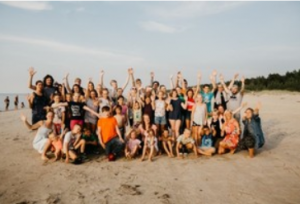 to August 4th, 2018. This creative camp was full of song, dance, games, study of history and culture, arts classes, sunset viewing, hot days and nights, fantastic people and brilliant weather in the unforgettable shore of the Baltic sea. It all ended with performance by summer camp kids at the annual Festival of Livs.
to August 4th, 2018. This creative camp was full of song, dance, games, study of history and culture, arts classes, sunset viewing, hot days and nights, fantastic people and brilliant weather in the unforgettable shore of the Baltic sea. It all ended with performance by summer camp kids at the annual Festival of Livs.
Livs language classes this time focussed on improving the pronunciation of words and sentences and participants could demonstrate their new skills at their final performance. During the course of the camp Reinis Zumbergs successfully managed an innovative activity, involving the participants, children’s own drawings and recorded words and sentences in a new App for studying the Livs language, available already now, but planned to be updated and expanded during the whole following year, under the name „Mierlinkizt” Language course. More on this: www.memrise.com/course/2013932/
There was an internal competition among the participants, and the winner would be chosen among the youths who were most active, diligent and who produced best results. The two lucky winners were traditionally awarded the title Liv of the year: “Paŗīmi līvli” and „Pišķi Paŗīmi līvli”. This year’ s lucky winners were Alise Vīķele and Katrīna Segliņa and they got to carry the festive wreath at the Festival of the Livs and do a ceremonial dedication to the Mother of Sea. Both girls also got a free ticket to next year’ s camp for their good work and dedication.
Looking forward to an equally exciting summer school next year!!
29.07.2019.
As this is the 13th volume in our series of popscience articles „Language in Practice: Observations and Recommendations”, we chose to let 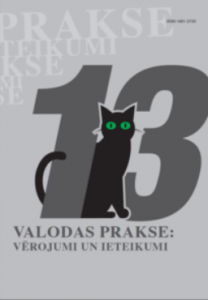 the content mirror the associations of the number 13. Seriously but with a hint of humour about the „unlucky number”, the dark and hellish, the horrendous and the mystifying, about historical paradoxes, stereotypes and reality.
the content mirror the associations of the number 13. Seriously but with a hint of humour about the „unlucky number”, the dark and hellish, the horrendous and the mystifying, about historical paradoxes, stereotypes and reality.
Authors of these articles offer a fresh view on issues related to language reception and usage, whilst also opening up some historic pages concerning the development of languages, as well as in some articles presenting some contemporary research data. Chapter „Magic of Words and Numbers” includes articles exploring linguistic stereotypes and myths existing in various different cultures, stereotypical reception of the Latvian language and how it affects some language related attitudes and the implementation of the national language policy. Symbology and mythology related to number 13 in Latvian culture and in traditional cultures of other nations. Chapter „Special Words and Special Usages” includes five articles regarding in particular placenames related to the idea of death or other disturbing phenomena, company and corporation logos and names exhibited in public urban areas that include elements of word play, or another article regarding the usage of word „ devil” and its synonyms in the Latvian language, linguistic means of evoking horror and fear in horror stories, and obviously the exciting theme of swearwords and their functions. Chapter „ Word in a Dictonary” deals with the „life” of word „thirteen” in various kinds of dictionaries and language corpi, as well as the differences observed in three consecutive editions of one and the same dictionary. Chapter „Historical Paradoxes” includes interesting articles about how the word „black”played a certain role when Lovonian peasants were given names, and another article on peculiarities in the implementation of print ban in Latgale and Lithuania at the turn of the XIX/ XX century. In the final chapter of this volume you will find an overview of the work and activities of the Terminology Commission of the Latvian Academy of Sciences, recent decisions and recommendations by the Centre for State Language and the Expert Committee on Latvian Language, as well as bibliography of recent linguistics related books and publications, the usual humour page and brief notes about the authors.
This volume is a little unusual, due to the number 13, but it turned out bright and multifaceted and will surely be a useful source of material for anyone with interest in Latvian language and a wish to explore its rich culture, variations in usage and recent research results.
This volume is available for purchase by following the link below:
Rakstu krājumu iespējams iegādāties Latviešu valodas aģentūrā.
29.07.2019.
Latvian Language Agency continues to develop the series of translated books on exciting issue of contemporary linguistics. 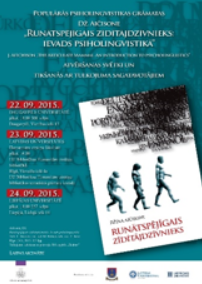
Just recently our agency has published a Latvian translation of the very popular book by J. Aitchison „The Articulate Mammal. An introduction to psycholinguistics”, whose original verison has already seen several repeat publications. The book has been translated to Latvian by Dr. habil. philol. Ina Druviete.
This is an easy to read pathfinder in psycholinguistics. In a pop science format the author explores the similarities and differences in the ways of communication among human beings and animals. Further there is an inquiry into the hypothesis of the origins of verbal language, and into the current debate regarding the nature vs. nurture, or the role of genetic make-up and upbringing in the individual development of a child’s language. There is much exciting new data about how linguistic knowledge relates to practical use of a language, how languages are comprehended and produced, as well as an overview of theoretical and empiric metods in research of the linguistic activity in the human brain. The author further tells about the ability of certain animals to learn some elements of human communication, and about how congenital or acquired disfunction of brain work affects the person’ s ability to understand and reproduce language.
This book is addressed to a broader audience of readers. The author uses a skillful way of introducing and presenting basic issues in psycholinguistics in a gradual way, so any prior knowledge is not required.
Festive opening of this publication in Latvian language will include a meeting with the translation project team and will will be held in the frames of European Language Days 2015 in Latvia. These events will be held at several universities: Daugavpils University (September 24th, 2015), Latvia University (September 23, 2015) and Liepaja University (September 24, 2015). Very welcome!
29.07.2019.
In the year 2014 Latvian Language Agency ran a series of public talks and discussions under umbrella name “Language in Translation”, following a good tradition going back to 2009. Public talks on the fascinating aspects of translation work, the mission of a translator and features of the Latvian language were conducted by literary critic Anita Rožkalne, and featured such well-known professionals in literary translation as Valdis Bisenieks, Dace Meiere, Pēteris Jankavs, Guntars Godiņš, Silvija Brice anbd Knuts Skujenieks. The series of events culminated with a conference on Translation Practice and Theory during the European Language Days that same year.
“Language in Translation” features transcripts of some of these public talks, speeches presented at the conference as well as reflexions and conclusions that came up during the final debate of this conference. This book comes together with an audio file.
Book is availbale for purchase from the Latvian Language Agency, price: 18,00 euro.
29.07.2019.
In 2012 Latvian Language Agency published a methodological study aid for learning Latvian as a foreign language, this book was written by 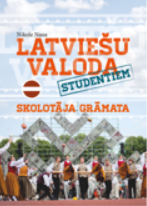 I. Klēvere-Velhi and N.Naua and the title was „„Latviešu valoda studentiem” („Latvian language for Students”, study book with audio material). Now we are glad to launch N.Naua’ s methodology and teaching aid for teahers „Latviešu valoda studentiem. Skolotāja grāmata” („Latvian Language for Students. Teacher’ s Book.)
I. Klēvere-Velhi and N.Naua and the title was „„Latviešu valoda studentiem” („Latvian language for Students”, study book with audio material). Now we are glad to launch N.Naua’ s methodology and teaching aid for teahers „Latviešu valoda studentiem. Skolotāja grāmata” („Latvian Language for Students. Teacher’ s Book.)
Methodology aid „Latvian Language for Students. Teacher’ s Book” offers teachers additional information regarding the content of the first book and tips for efficient use of the study material. Teacher’ s Book includes explanations of certain grammar rules, additional grammar tables and examples from texts and dialogues in the study book for students.
There is no new lexical additions in the explanations part. In order to help students expand their knowledge of grammar and the phonetic system of the Latvian language, the Teacher’ s Book also includes additional exercises and creative and inspiring ideas for brushing up language skills. There is a separate chapter „Additional Information Regarding Grammar and Phonetics of the Latvian Language”. This chapter provided concise definitions of certain grammar rules and questions that have been elaborated upon in several chapters of the book, but should nevertheless be regularly revised to better memorize in order to master them. Other questions, especially those that are part of the first ten chapters, have been already explained in the content summary of each respective chapter.
This Methodology aid can be obtained by contacting our agency by following the link below:
Metodisko līdzekli iespējams iegādāties Latviešu valodas aģentūrā.
29.07.2019.
Latvian Language Agency had newly launched a publication of student creative writing under the original title “Dzimtas stāsti. Ar 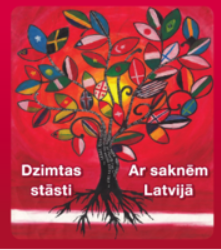 saknēm Latvijā” („Family Stories. Rooted in Latvia”.) This story collection includes the written work in form of essays, stories and drawings by winners of student creative work competition. Student work presents a manifold picture of family histories over several generations, the fates of different branches of families over time, traditions, beliefs, ethical and esthetical value systems, connections to Latvian cultural heritage and the bigger narrative of our national history.
saknēm Latvijā” („Family Stories. Rooted in Latvia”.) This story collection includes the written work in form of essays, stories and drawings by winners of student creative work competition. Student work presents a manifold picture of family histories over several generations, the fates of different branches of families over time, traditions, beliefs, ethical and esthetical value systems, connections to Latvian cultural heritage and the bigger narrative of our national history.
There is a rich gallery of stories and characters, with a touch of exciting and even comic situations and scenes of life, as well as portraits of family members written with warmth and care. Some of the work includes deep and serious look into the characters of family members, their gifts and talents, hard work and capacity to withstand very harsh and dramatic challenges during major historic shifts.
This is the seventh volume in our series of collections of school student writing on patriotic themes.
Book is available for purchase from Latvian Language Agency.
18.10.2018.
The Latvian language Agency is paying tribute to the European Language Day and hosting a symposium „Challenges in the Daily Life of Language Consultants” on the 18th of October.
Among the speakers at the symposium will be active language consultants from the Estonian Language Institute, Lithuanian State Language Commission, the Academy of Sciences of the Russian Federation, Language Institute of Finland, Academy of Sciences of the Czech Republic and the Latvian Language Agency.
From te Latvian side there will be guest speakers also from the State Language Centre and the Artificial Intelligence Laboratory of the Institute of Mathematics and Information Technologies of the Latvia University. Read more
29.09.2018.
European Language Day is an initiative launched by the Council of Europe. Latvian Language Agency has been responsible for carrying out events in Latvia under this initiative for already fourteen years. Events are planned and completed in close collaboration with loca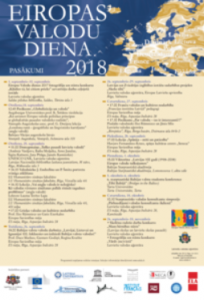 l partner organisations. European Language Day is usually marked in September 26th, however there are a wide variety of events happening also before and after this exact date. This year European Language Day events in Latvia will be held between September 18th and October 18th. Events are aimed at enriching the experience of learning and using a wide variety of European languages, whilst also honouring the Latvian language as the official state language of this country.
l partner organisations. European Language Day is usually marked in September 26th, however there are a wide variety of events happening also before and after this exact date. This year European Language Day events in Latvia will be held between September 18th and October 18th. Events are aimed at enriching the experience of learning and using a wide variety of European languages, whilst also honouring the Latvian language as the official state language of this country.
European Language Day programme in Latvia will be launched on September 18th at the Ventspils University of Applied Sciences – with an event „Globalisation and Language” produced by the Baltic – German University Liaison Office. Most of the other events will be held between September 25th and October 18th.
Daily events from September 25th to September 28th at the European Union House in Riga, 28, Aspazijas Boulevard will offer language classes and provide an experience of the wide variety of languages in Europe. Please see more information about language workshops at: : www.esmaja.lv/eiropas-valodu-diena/no-25-lidz-28-septembrim-iepazisti-eiropas-valodas-es-maja
 excellent prices.
excellent prices.







